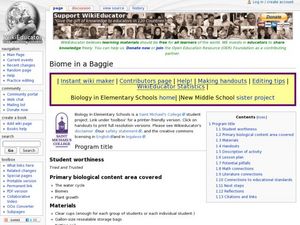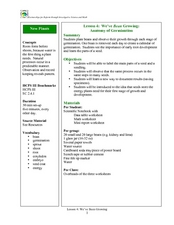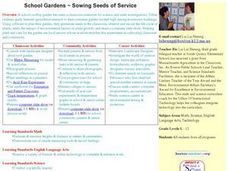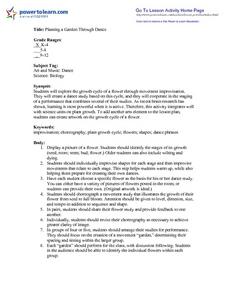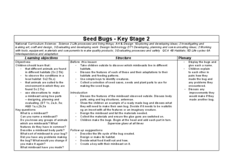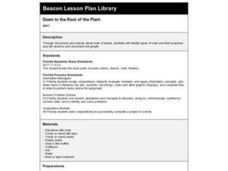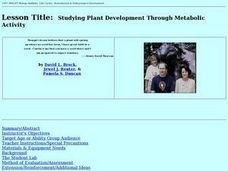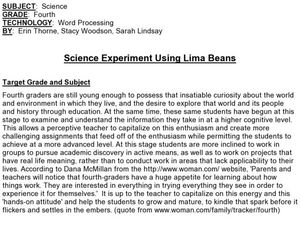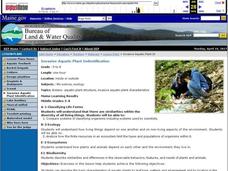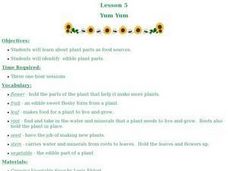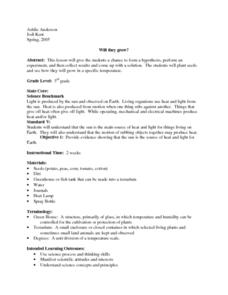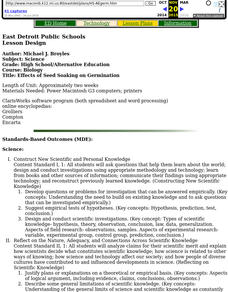Curated OER
Biomes and the water cycle
Students create a desert biome and a prairie biome and see how plants survive in both. In this biomes lesson plan, studnets create their biomes and see how the water cycle effect each biome and plant differently.
Curated OER
Plants
Really only five slides of information, this resource is an outline on planting field crops. From it, aspiring agriculturists are exposed to different seeding methods: drilling, row crop planting, broadcast seeding, and air seeding. This...
Curated OER
The Dirt on Plants
Students draw and label the four parts of a plant. They describe changes that are part of the common life cycle. Students follow various one and two step directions. They are asked to discuss that they can recall about plants.
Curated OER
We’ve Bean Growing: Anatomy of Germination
Students identify the main parts of a seed. In this biology lesson, students explain the factors needed for the seed to grow. They record observations everyday and report findings to class.
Curated OER
Mountains
Explore the mountain habitat with this collection of slides. The climate is described, along with the associated plant and animal life. Some of the pictures are attractive, but some leave much to be desired. There is a generous amount of...
Curated OER
Sowing Seeds of Service
Third graders use metric measuring for model and actual plan in designing a roof garden. They photograph the process, record results in a journal, and plant seedlings in small containers. Finally, 3rd graders complete an acid rain...
Curated OER
From Seed to Plant
In this seed to plant worksheet, students match a set of 5 vocabulary words to their correct definitions. Words are given in a word bank at the bottom of the page.
Curated OER
Growing Tomatoes from Seed
In this growing tomatoes worksheet, students experience and participate in the process of growing tomatoes over a three or four month span of time. Students follow six directives in producing tomato plants.
Curated OER
Planting a Garden Through Dance
Students create a dance study based on the growth cycle of a flower. They improvise movements that relate to each stage of growth. They create artwork on the growth cycle of a flower. They perform their dances for the whole class.
Curated OER
How do rice farmers make good use of the land they use for planting rice?
Second graders discuss how farmers grow rice. In this rice growing lesson, 2nd graders see the optimal condition for land in order to grow rice. They experiment with clay and garden soil to see which holds water better.
Curated OER
Plant Adaptations
Students identify parts of prairie plants. They sketch the plants indicating its adaptive parts and write brief descriptions of them. They present their findings to the class.
Curated OER
Seed Bugs; Stage 2
Students examine nature by participating in an environmental art activity. In this imaginary creature lesson, students discuss the importance of a habitat when pertaining to wild animals or bugs. Students utilize tree parts which they...
Curated OER
Down to the Root of the Plant
Second graders identify types of roots and their purposes and observe and document root growth. students observe their roots once a week and measure them to see if there has been any change. Each student keeps a written log of the...
Curated OER
From Seed to Apple
Students identify the stages of apple growth. In this agricultural lesson, students read the story I Am Apple and sing the song "Round the Apple Tree." Students place pictures of the stages of an apple into the correct order. Students...
Curated OER
Studying Plant Development Through Metabolic Activity
A hands-on activity which allows learners to learn about cellular respiration. This lesson contains a range of investigations testing the rates of cellular respiration to demonstrate the relationship between metabolic rates of...
Curated OER
Science Experiment Using Lima Beans
Fourth graders tie together elements about the world and their environment. Students incorporate styles of higher order thinking skills. Students measure skills of observations, conclusions, inferences and predictions.
Curated OER
Invasive Aquatic Plant Identification
Young scholars observe aquatic plants and animals and identify their systems. In this plants and animals lesson plan, students compare systems of organisms and orally express how plants and animals rely on each other.
Curated OER
Plant Parts
In this identifying the parts of a fruit tree instructional activity, students read the identifying words, observe the picture of the tree with fruit, and draw a line to match the parts of the tree. Students match four parts.
Perkins School for the Blind
Creating a 3-D Model of a Plant Life
Instructing blind or visually impaired learners means you need to make symbolic tactile representations of various processes to provide as much input as possible. But wouldn't it be even better to have your learners make the models...
Curated OER
Teaching Biology Through Problem-based Activities
Young scholars plant seeds and observe the life cycle of the organism. They experimentally research the effects of radiation on seed growth. Students determine the effects of environmental pollutants on harvested seed.
Curated OER
Yum Yum: Making Vegetable Soup
Students investigate agriculture by reading a book. In this plant life lesson, students read the book Growing Vegetable Soup by Louis Ehlert, and examine the ingredients used in the book's soup. Students create an...
Curated OER
Will they grow?
Third graders plant seeds and see how they will grow in a specific temperature and are questioned about different environments and how they think crops would grow there. They form a hypothesis, perform an experiment, and then collect...
Curated OER
Whitewater Canal State Historic Site
If you happen to live in Indiana, or a neighboring state, and are planning a field trip to the Whitewater Canal State Historic Site, then this lesson plan will suit your needs quite well. In it, suggestions for activities before, during,...
Curated OER
Effects of Seed Soaking on Germination
High schoolers explain the standard growth pattern of a monocot seedling and word process a finished essay.


